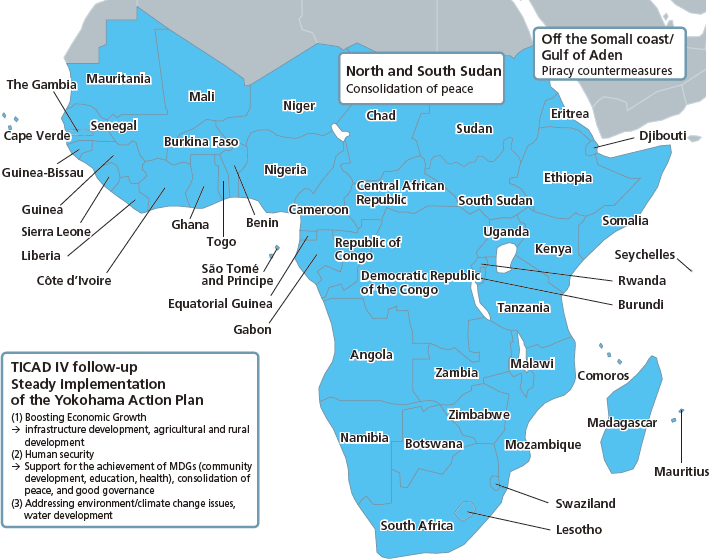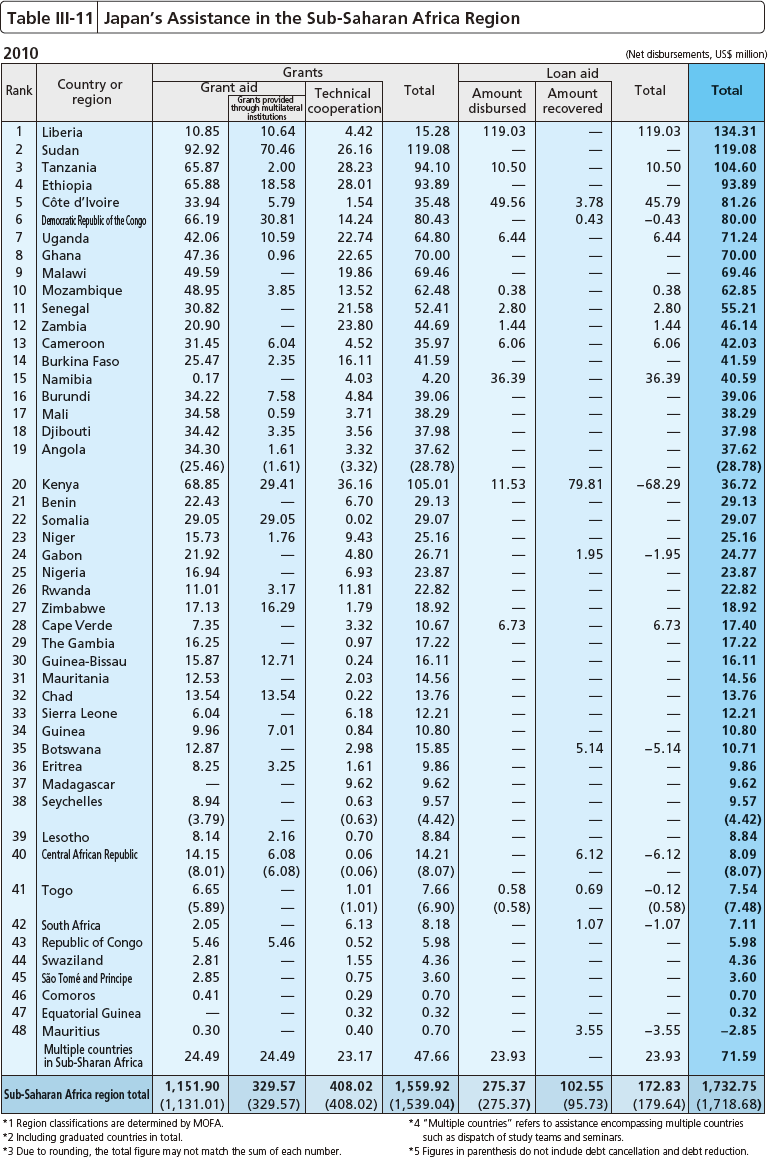Japan's Official Development Assistance White Paper 2011
4. Sub-Saharan Africa
Africa, particularly the region located south of the Sahara Desert that is referred to as "Sub-Sahara," continues to face serious problems of poverty. The majority of Sub-Saharan African countries (33 of the 49 countries) are Least Developed Countries (LDCs), and approximately half the population lives at or below the poverty line of $1.25 per day. In addition, many of the countries in the region face civil war and other conflicts, refugees, famine resulting from drought, the spread of infectious diseases such as HIV/AIDS, and other serious problems that hinder development, and require a significant amount of aid from the international community. These problems in Africa are critical interests of international community in such forums as the UN Security Council and, the G8 Summit.
At the same time, Africa is blessed with abundant natural resources, and has achieved remarkable economic growth in recent years. Being a "continent of hope and opportunity," Africa is drawing more and more attention from the international community.
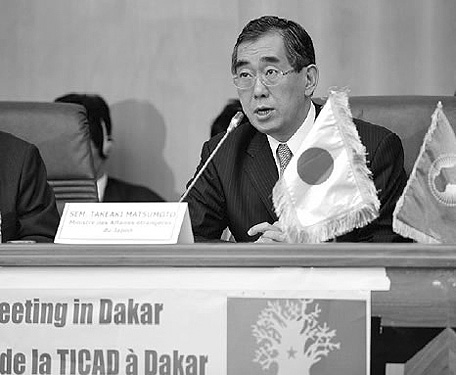
Minister for Foreign Affairs Takeaki Matsumoto makes a statement at the Third TICAD Ministerial Follow-up Meeting in Senegal
<Japan's Efforts>
Japan has proactively cooperated in efforts led by African countries to address development issues through the Tokyo International Conference on African Development (TICAD), which is based on the fundamental principle of Africa's self-help efforts (ownership) as well as international cooperation (partnership). In May 2008, 15 years after TICAD was launched in 1993, TICAD IV was held in Yokohama. In May 2011, the Third TICAD Ministerial Follow-up Meeting was held in Dakar, Senegal. At the meeting, Japan stated that it would continue taking an active role in enhancing peace and stability in the international community, and expressed its unwavering determination to faithfully implement the TICAD IV pledges, overcoming the recent earthquake disaster. This received high praise from participated countries and organizations. Japan will host the TICAD V in 2013 as the Prime Minister Noda announced in his speech to the U.N. General Assembly.
Japan also contributes to efforts to achieve peace and stability in the African region. For example, assistance for Sudan is another example of assistance for consolidation of peace, which is taken up as a priority area at TICAD-IV, and is emphasized as one of the important pillars of Japan's African policy. At the Third Sudan Consortium Conference held in Oslo in 2008, Japan announced additional assistance of approximately $200 million for the immediate future. This assistance bears in mind (i) the balance between Sudan and South Sudan, (ii) the gradual shift of Japan’s assistance from the early recovery humanitarian stage to the reconstruction and development phase, and (iii) rectification of regional disparities. As of August 2010, approximately $220 million had been disbursed. In particular, considering the referendum on the independence of Southern Sudan held in January 2011 to be the culmination of the process of implementation of the Comprehensive Peace Agreement (CPA), Japan has been working for the consolidation of peace in Sudan, for example, with emergency grant aid amounting to approximately $8 million for the referendum In addition, Japan also collaborates with international organizations and Japanese NGOs to provide assistance for the repatriation and reintegration of refugees, removal of landmines and unexploded ordnance and education for avoiding such dangers, medical assistance against infectious diseases in children, and food aid (see page 101 for details regarding Sudan).
Tokyo International Conference on African Development (TICAD)
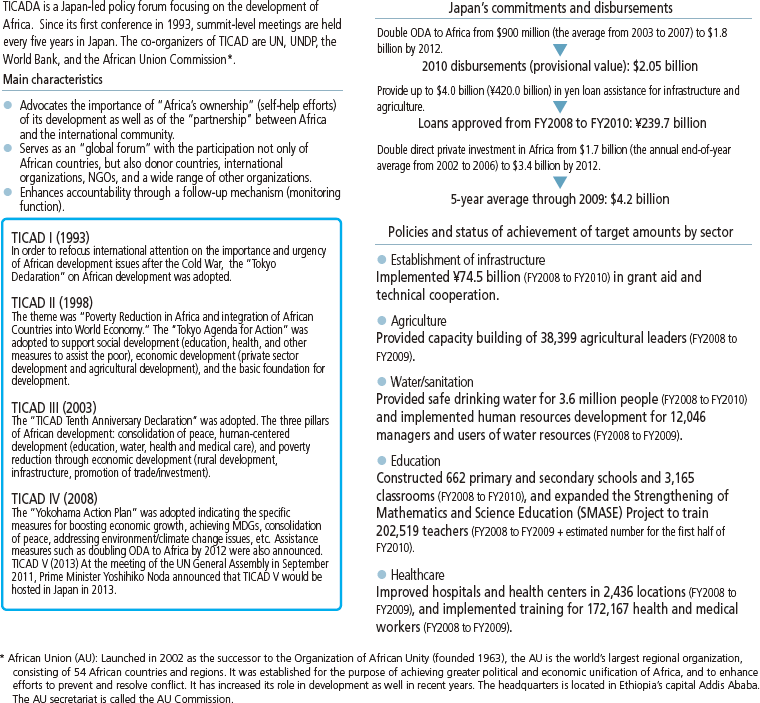
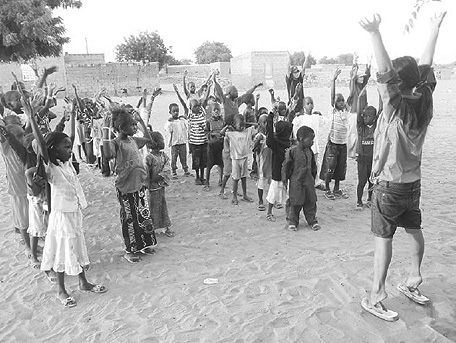
A Japan Overseas Cooperation Volunteer teaches children Japanese "radio calisthenics" in Senegal (Photo: Erina Hirobe)
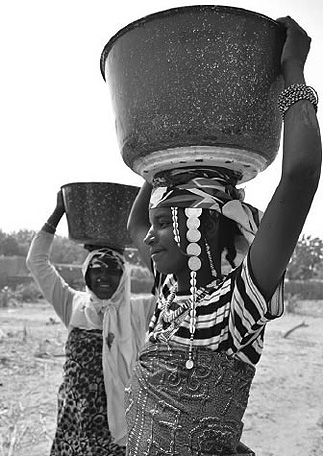
Nigerien women carry water (Photo: Seico Tamai)
[Tanzania]
"Arusha-Namanga-Athi River Road Development Project"
Loan Aid (March 2007 - Current)
The majority of overland transportation in Africa depends on roads. In particular, improvement of international highway is essential to stimulate economic activity and flow of goods including those with neighboring countries. The road between Arusha in northern Tanzania and the Athi River in Kenya constitutes a major portion of the international highway that connects the capitals of the two countries. However, natural disasters such as flooding, as well as insufficient road maintenance and management, are causing the condition of the road to deteriorate. On the other hand, through the launch of a customs union by the East African Community (including Tanzania and Kenya) and other factors, trade between the two countries is expected to increase. Accordingly, Japan has contributed a total of ¥6.8 billion in loan aid in response to a request from the government of Tanzania. Through co-financing with the African Development Bank, Japan is working for improvement of the road between Arusha and Namanga located on the border with Kenya, as well as establishment of One-Stop Border Post facilities that streamline border procedures. (Construction of roads on the Kenyan side is financed by the African Development Bank alone.) This project is expected not only to improve the lives of people living along the road and stimulate the local economy, but also to further revitalize trade between Tanzania and Kenya.
* One-stop border post: A location that enables efficient, one-time execution of border crossing procedures on land routes

A view of construction of a road between Arusha and Namanga (Photo: East African Community)
Japan's international cooperation policy in the Sub-Saharan Africa Region
